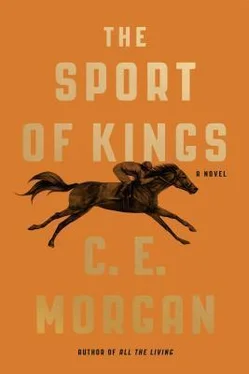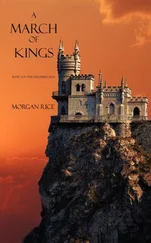* * *
Mack was screaming himself hoarse. He hated the Derby — hated all the hats and the cheesedick celebrities, hated the dilettantes, the brutal distance, the field thick with worthless runners, and he really hated that his most prominent owner — the increasingly witless and unreliable Henry Forge — had not shown up to the prerace press conference, nor the morning workouts on the most important day of his entire life as an owner, and was now refusing to pick up his fucking phone. He hated to an almost biblical degree that he had to call any owner twenty times — it made him feel like a lovesick straight chasing a skirt.
The whole Derby rigamarole was a bullshit sham and a shitshow, except for this, this, THIS. And THIS is why he was screaming, his suit jacket threatening to rip at the seams as he reached his triumphant arms over his head, his mouth hollering gibberish, his Stetson behind him on the ground, band up and collecting rain. And now once again — still hollering like a bear — he was snatching the cell phone out of his jacket pocket and dialing Henry’s number, his eyes bugging. Turning hard right and then hard left, he spat, “Where in the everloving fuck is Henry Forge?!”
Allmon was weeping openly, limping toward Hell on the dirt track as fast as his legs could carry him. She was victorious, unbroken, and covered head to toe in mud, but he would always know her amidst the field of pretenders. His scream sounded more like a war cry than delight. He caught her fast while Reuben was still standing in the irons, pumping his fists and screaming for glory. Barely able to control his hands as the blood of victory flowed through him, Allmon drew her round in a fast circle to bank her fires, then haltered her on the saturated carpet of grass. He would live, he would live, he could feel himself growing into a new being as Hell’s eyes rolled with her unspent energy. Filthy and carved with proud flesh, she was an unholy mess, as battered as an old pot, but still shimmering with beauty when two men appeared with the leaden blanket of bloodred roses. She skittered once to the right as they approached, blowing air with bubbles of blood. Then Reuben sat down on the saddle and with his help, they draped the forty-pound garland of Freedom roses across her back. Instantly Hellsmouth stilled, then she bowed slightly as if surprised by the weight of the thing, then stamped her front hooves and hopped once to show that the weight was nothing — nothing at all. There are some animals that crumple under victory, but she wasn’t one of them. She trampled the geraniums when Allmon led her into the winner’s circle.
The whole of this wet Saturday had spilled into the circle — Mack and his assistant trainers, old friends of the Forges, the mayor of Paris, the governor himself. They were flocked by blue vests, the press circling the circle, cameras perched at the wing blade. But there was a rumbling among them, some confusion, some pointing. Reuben clutched his bouquet of sixty roses and turned to them with a brilliant grin. “Wherefore the wait, y’all?” he said.
They were waiting on Henry Forge.
Mack, his dripping Stetson returned to his head, made a rolling gesture with his hands, snapping, “Take the picture, take the damn picture.” Allmon corralled what strength he had left in his body and stood tall. He could feel Hell’s explosive breath on his shoulder and droplets of her blood on his polo. He felt like he would never die. The circle exploded in artificial light.
And then it was over, just like that. Allmon led the dancing filly away to the hermetic world of the backstretch, and everyone else trouped onto the pagoda and stood behind the rail, which, glossed with rain, shined like white ice under an emergent, hesitant sun.
One last time, Mack checked his cell phone. “Motherfucker,” he snapped, and when Bob Costas shot a hard, inquiring glance in his direction, he just glowered and tucked his chin. Arms crossed to contain his bunched fists, Mack was fairly rippling with irritation. But was so blissed he could hardly stand up straight.
The chairman of Churchill Downs was saying something Mack didn’t give a shit about — HE HAD WON HIS FILLY HAD WON — then the governor turned to Mack with the trophy in his hands and had damn near unrolled his entire speech before he blurted, “Where’s Mr. Forge?”
Mack’s lips blanched against each other for a second, then: “Don’t believe I’ve seen him in the neighborhood.”
“No winning owner has ever missed a Derby that I can recall,” said Costas. “This would be an unusual first in the history of the sport.”
In front of the crowd, in front of God and a live television audience, Mack reached out and wrestled the cold, beringed trophy out of the governor’s startled hands and said, “Well, it’s hard as hell to find good help these days.”
* * *
They don’t even know who he is. He’s not leaping up as a victor on Millionaires Row or spilling a julep down his shirtfront, he’s not roaring beside an overpriced trainer like an Achaean in Troy. No one reaches out to pump his hand or clap his back. He’s nothing but a common spectator on the ground floor of the grandstand — behind all the celebrants, back where they sell burgoo and beer on tap. He’s standing on a bed of torn gambling stubs, and there’s gum on the bottom of his expensive shoe. He’s struggling to cover the ears of a smiling baby, but his eyes are trained on the horse, now being led back into the tunnel, the monster filly that has left the crowd delirious. Someday they will tell their grandchildren they were there the day the big girl won. They will say how they knew it was her, even though they all looked alike, how strong she was, how she danced at the finish and spun like a weathervane. They will make a legend of her simple runner’s life. They won’t understand that she was racing on a prayer of a leg. They won’t know that painkillers were coursing through her gladiator’s blood. And they won’t understand what happened next. They’ll think Henry was an idiot or a madman. But the madness had all come before.
New knowledge is sunflower honey on the tongue.
And so began the third and final movement of Henry Forge’s life.
There were voices on the river, and one was his own. It was a pleasing baritone that chatted easily with the other picnickers and called out greetings to a few acquaintances, but Scipio heard it as if from a great distance, as if it had come rolling down a long corridor, startling him before he recognized it as his own. This happened to him often. He would walk into their home in Bucktown after a long day up at the Rankin house, where he was busy constructing a new carriage house, and suddenly see a woman standing there in what he knew to be his own little home, and think: Who is this gal with the brown calico eyes and the heavy bosom, who stands there so familiar-like? One time he had even said hello and embraced her before he remembered with the whole of his body, oh yes, this is my wife. The woman I have sworn to love.
His family had brought him here today, but he hadn’t wanted to come — never ever wanted to return to the river’s edge, even though his house stood a mere half mile from its banks. Mercy had pleaded, as well as Joe, who had recently begun to apprentice with the blacksmith on Liberty, and then there was little Laney. Little Gal, Big Trouble, that’s what he called her. Such a bold child and only eight years old. It stalled his heart to think of her lack of fear — always beating up on boys, even those a few years older than herself, showing up afternoons at the Rankin doorstep, having dodged wagons and herds of swine and God knows what else to escape her mother and arrive there alone. Where on earth had she gotten such unvarnished force? From him, of course. Once upon a time, he too had been without fear. Back when he lived in the body he had been given at birth, back when he had belonged to himself even within the devil’s system of slavery, back when he did not wait for voices — his own and many others, all lost now — to roll down time’s corridors to confuse his ear.
Читать дальше
Конец ознакомительного отрывка
Купить книгу












